Top Data Providers in Procurement


Quality data is essential for procurement in this day and age.
It enables informed supplier decision-making and helps mitigate risk.
Yet, despite the growing reliance on data, it’s worth asking:
Are we partnering with the right data providers to meet our goals?
Today, we will explore nine of the best procurement data providers to help answer that question.
We’ll break down their strengths, specialties, and how they can support your unique procurement needs.
Without further ado, let’s dive in.
The first on the list is our very own Veridion.
At Veridion, our proprietary machine learning models constantly scour the Internet, transforming unstructured data into a highly accurate, organized, and continuously updated database of company information.
Currently, Veridion offers an extensive database of over 120 million companies across more than 240 locations worldwide.
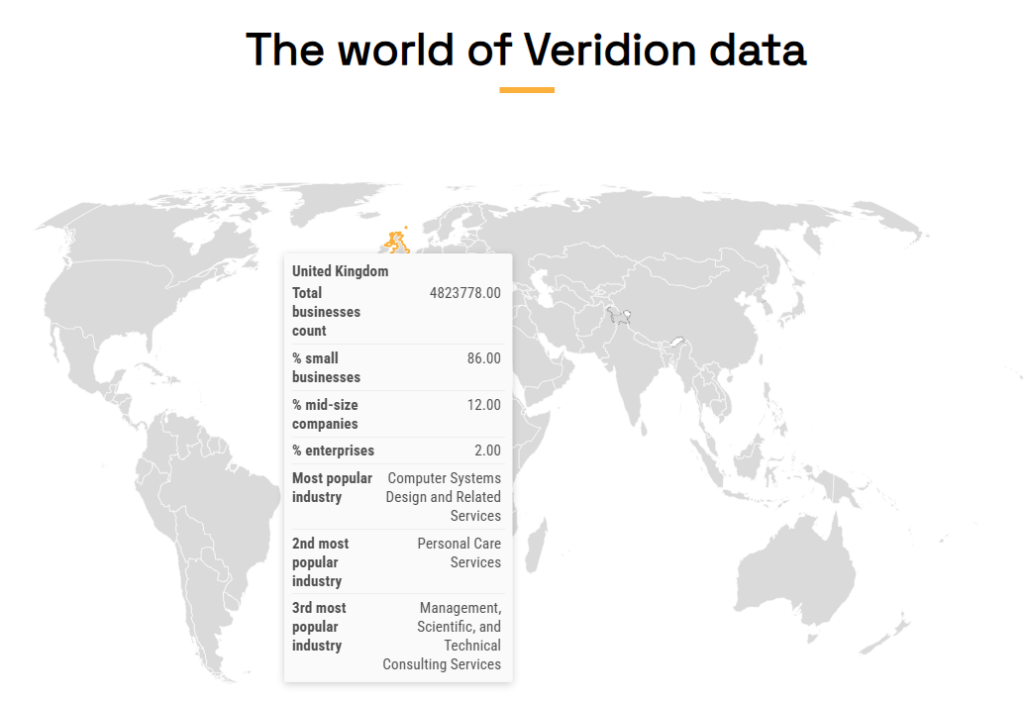
Source: Veridion
This data is updated in near real-time and offers over 80 critical data points, covering comprehensive supplier data, analytics, and market insights.
More specifically, our supplier data includes the following:
For instance, the image below shows Veridion’s comprehensive ESG data taxonomy:

Source: Veridion
In terms of the amount and quality of data provided, Veridion is comparable to only a few other tools on our list.
This also applies to how easily this data can be accessed, using our Complex Search and Match & Enrich APIs, which can be easily integrated into your systems.
In fact, with our Search API, you can quickly find suppliers with highly specific criteria, as shown in the example below:
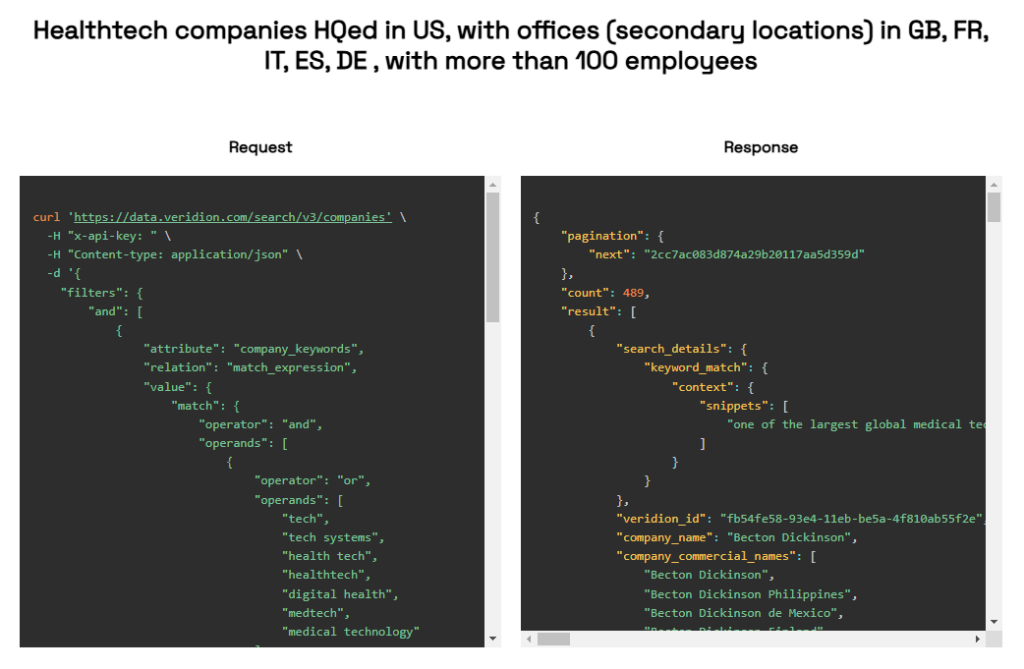
Source: Veridion
You can also use our data enrichment service to update your existing datasets with the latest information, including firmographics, financials, and risk indicators.
Now, while these APIs require some technical expertise, we’re constantly innovating.
With our latest AI-powered Scout feature, you can search for suppliers using nothing but natural language—no coding needed.
Source: Veridion on YouTube
Our system then turns your query into precise results in seconds, pulling from our vast database.
If all this seems like it could be an asset to your procurement operations, explore our platform further.
Download our data samples or schedule a data consultation, and see what else Veridion can do for you.
Next, we have one of the leaders in business intelligence, Dun & Bradstreet (D&B).
D&B provides commercial data, analytics, and insights for businesses.
This data provider boasts the largest database on our list, with information on over 580 million companies worldwide.
They collect this data meticulously through several sources illustrated below:

Source: D&B
Similar to Veridion, D&B also has a proprietary sourcing process called DUNSRight™, which helps them collect, organize, and refresh their data daily.
While you can access this data with APIs similar to other tools on this list, you can also access it through their specialized solutions like:
There’s also their D&B Connect platform to clean, visualize, and easily assess data.
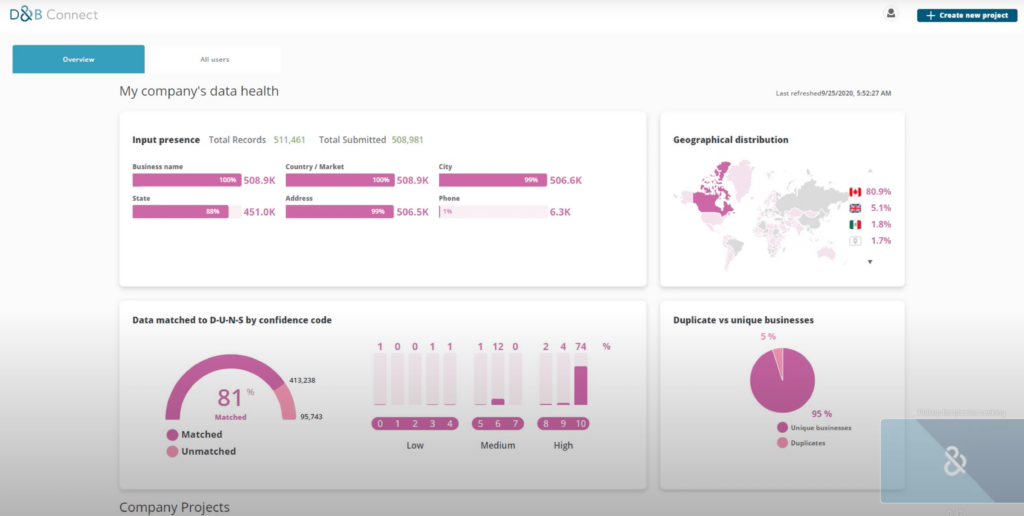
Source: Dun & Bradstreet on YouTube
Now, while D&B’s data is consistently refreshed and reliable, it’s important to note some limitations compared to alternatives.
Their database tends to focus more on established businesses, which means it may lack deeper insights into smaller or niche suppliers and startups.
Additionally, accessing certain non-public financial data can be challenging, as it often relies on self-reporting by the companies themselves.
However, if you need a comprehensive view of larger companies, especially for credit evaluations and financial risk assessment, D&B is an excellent choice.
Third on our list is the SAP Business Network, formerly known as the Ariba Network, connecting over 5 million companies worldwide.
This database is the central repository for supplier data for the SAP Ariba procurement and supply chain management tools, which are widely used by large enterprises around the globe.
The benefit of the SAP Business Network is that businesses can access a single, unified portal to:
The main strength of using SAP’s Business Network is the ability to streamline procurement workflows through its integration with SAP Ariba.
For example, you can conduct supplier negotiations directly within SAP Ariba, as illustrated below:
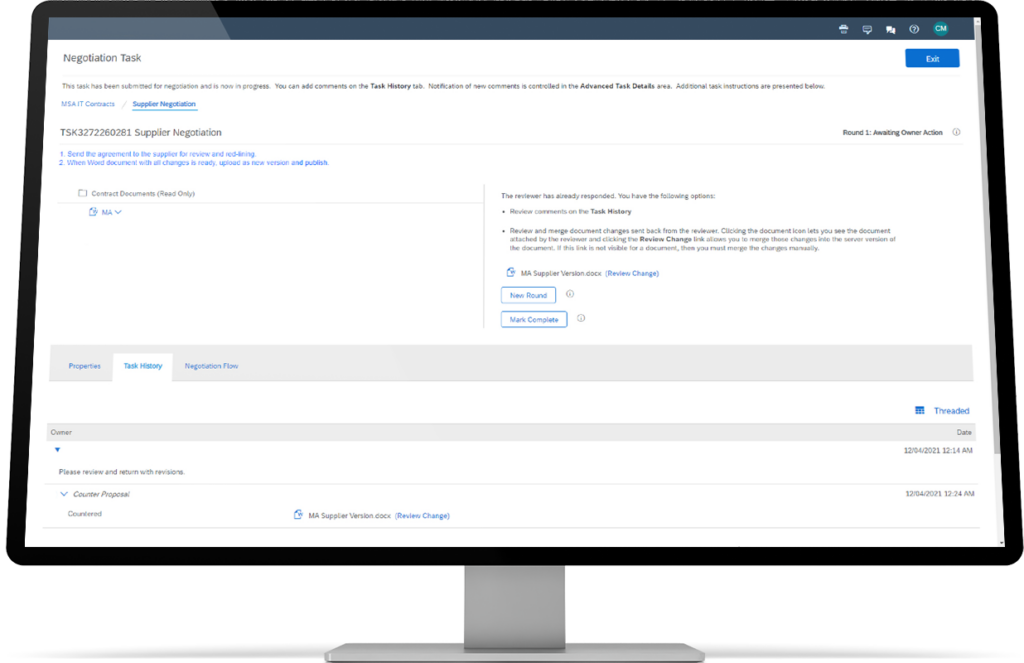
Source: SAP
Moreover, the platform allows you to post RFIs, which are seamlessly distributed across its extensive network of global companies spanning more than UNSPSC categories.

Source: SAP
While the SAP Business Network excels in enhancing procurement workflows and fostering supplier collaboration, it falls short when it comes to providing in-depth supplier intelligence.
For example, it doesn’t offer as much detailed data on a supplier’s financial health or performance as other platforms like Veridion.
That said, if your primary focus is streamlining procurement processes and improving collaboration, SAP’s Business Network and Ariba platform are highly recommended options to explore.
EcoVadis is a provider of business sustainability data that focuses on environmental, social, and ethical performance.
Their platform has screened over 2.8 million companies, with more than 150,000 receiving EcoVadis’ sustainability ratings.

Source: EcoVadis
While the database is more limited compared to other providers, the growing number of rated companies and the depth of their sustainability ratings make it a valuable tool.
These ratings cover core ESG aspects, including environment, labor and human rights, ethics, and sustainable procurement, as shown in the sample below:

Source: EcoVadis
Other key features include:
This tool is highly specialized and particularly valuable if your organization needs to focus on compliance with regulatory requirements or respond to increasing stakeholder demand for responsible sourcing.
However, this specialization can also be a limitation, as it doesn’t take into account a broader business context.
For example, when compared to Veridion, which enriches ESG profiles with firmographic attributes like company location, products, services, and metrics such as NAICS classification, employee count, and revenue, EcoVadis doesn’t provide the same level of detailed company data.
That said, EcoVadis can still be a useful supplement.
It allows you to validate existing ratings, gain a second opinion, or access more granular sustainability data when needed.
Beroe LiVE.Ai is an AI-driven integrated market intelligence platform designed for procurement teams.
It provides a single source for market intelligence, supplier risk assessment, supplier shortlisting, benchmarking, and market indices.
Their database includes over 1.5 million global suppliers, 350 data series, and 14 million data points covering market, cost, price, supply chain, and risk information.
Searching through this database is made easy with their supplier discovery solution, enabling searches based on specific criteria.
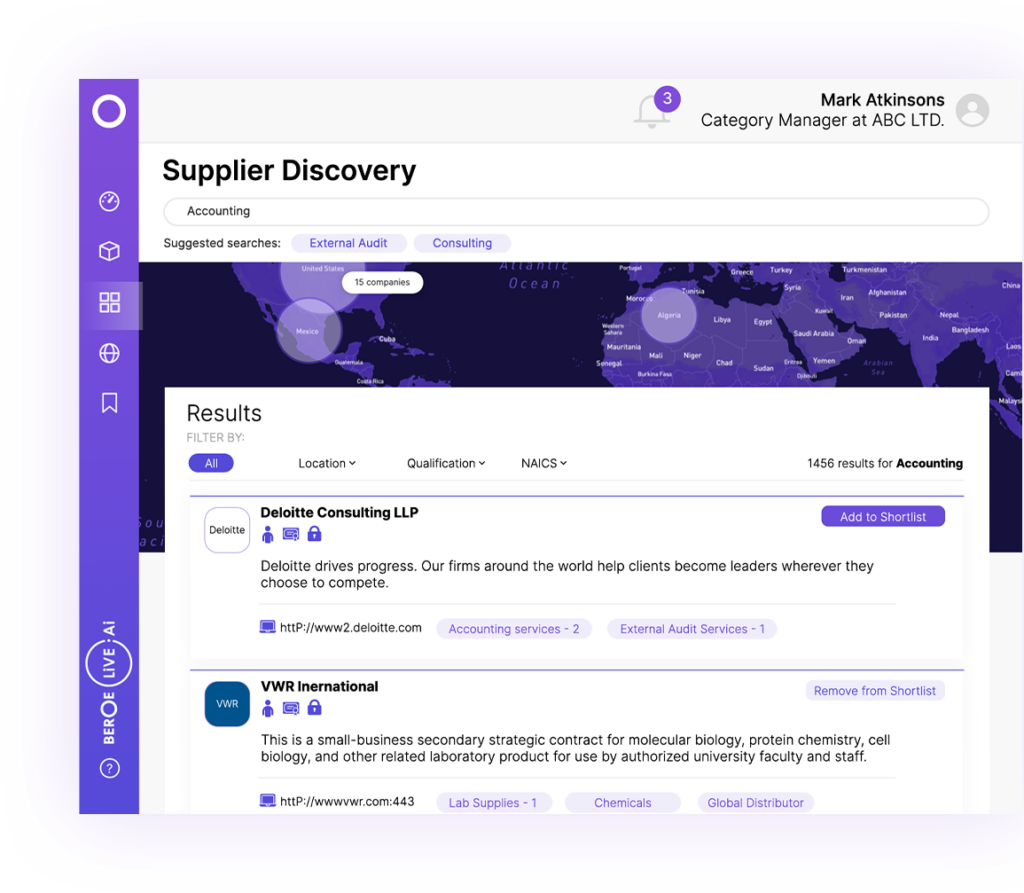
Source: Beroe
As a primarily market intelligence platform, Beroe’s Datahub uses its own researched and curated data, offering a good view of the global procurement landscape with trusted insights on thousands of suppliers, categories, and entire supply chains.
Key features include:
Furthermore, Beroe’s 30+ APIs can be used for digital category strategy creation, sourcing optimization, negotiation, and opportunity identification, enabling you to access and manage their data.

Source: Beroe
Now, because Beroe is highly specialized, it has a narrower list of suppliers compared to some other providers, and a much more limited feature set.
So, if you are interested in this platform, you should also explore Beroe’s partnerships with larger providers like D&B and SAP Ariba that supplement their offerings.
Next up is LexisNexis, a leading provider of legal, regulatory, and business information and analytics.
They offer a vast suite of solutions for various industries, including legal, corporate, government, and academic sectors.
LexisNexis database covers over 100 million companies worldwide, with the following types of company data provided:
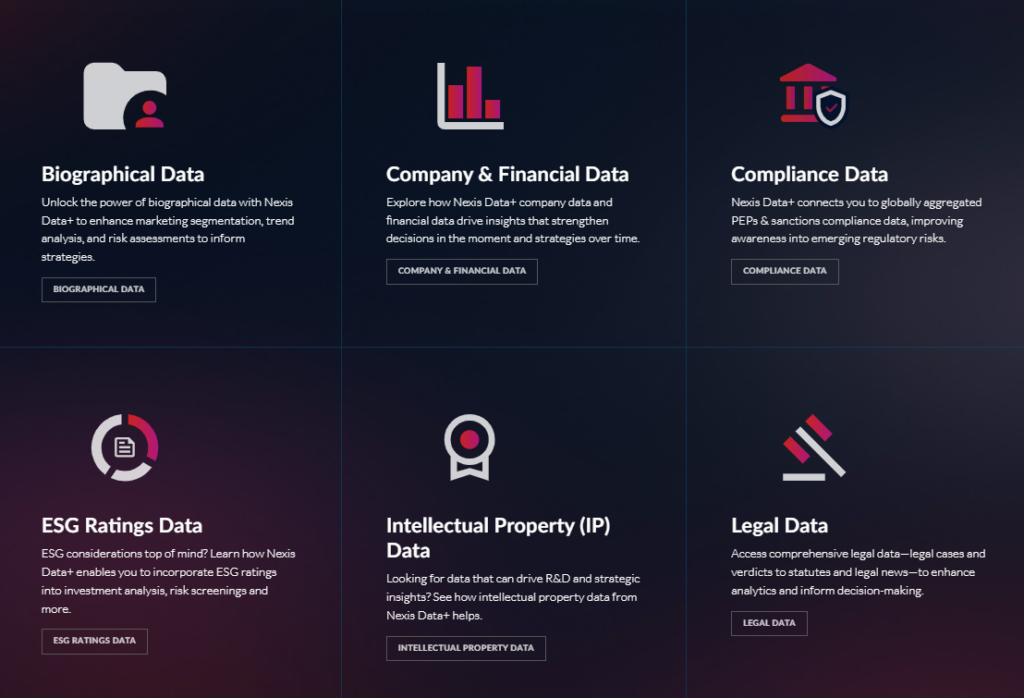
Source: LexisNexis
Where LexisNexis truly shines is in financial, risk, and compliance information, with access to data like:
On top of that, this provider has some specific solutions related to procurement, such as the Vendor Risk Management Solution, which leverages LexisNexis’s extensive database.
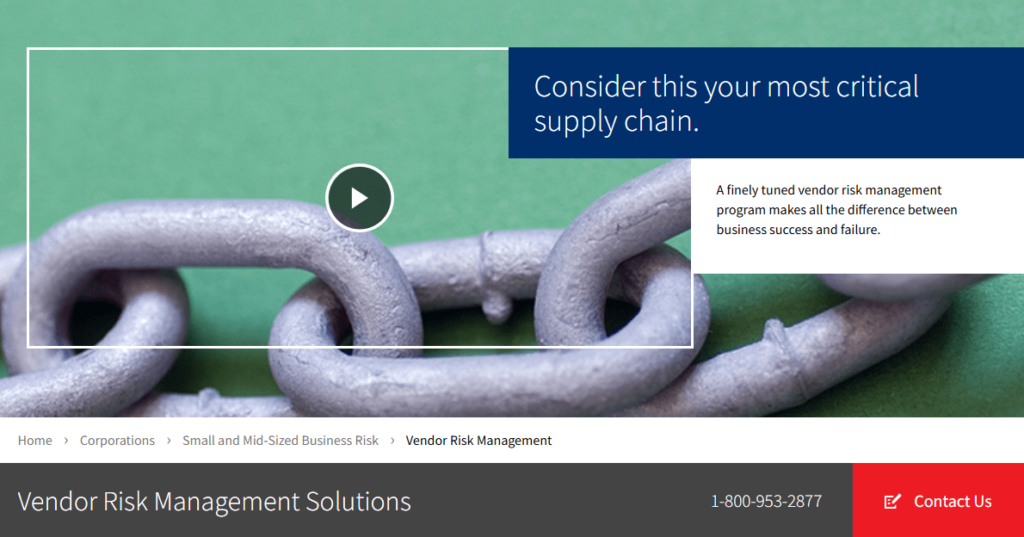
Source: LexisNexis
There’s also their WorldCompliance™ Data, which delivers industry-recognized, robust compliance data and sanctions expertise to help your business efficiently screen transactions and mitigate costly risks.
That being said, LexisNexis is a broad data provider and may lack some procurement-specific information.
For example, we couldn’t find product and service data or technographics available on platforms like Veridion, nor the market intelligence offered by platforms such as Beroe.
The only procurement-specific data solution offered is Lexis ProcureCheck, which, according to their website, is tailored specifically for the South African market.
This specialization is something to consider when evaluating your needs.
Moody’s Orbis, formerly known as Bureau van Dijk, is a comprehensive company information platform providing in-depth data and analytics on private and public companies worldwide.
Their database covers over 550 million global entities and companies.
It provides data such as ratings, ownership information, default data, ESG and climate scores, real estate data, financials, and M&A data.
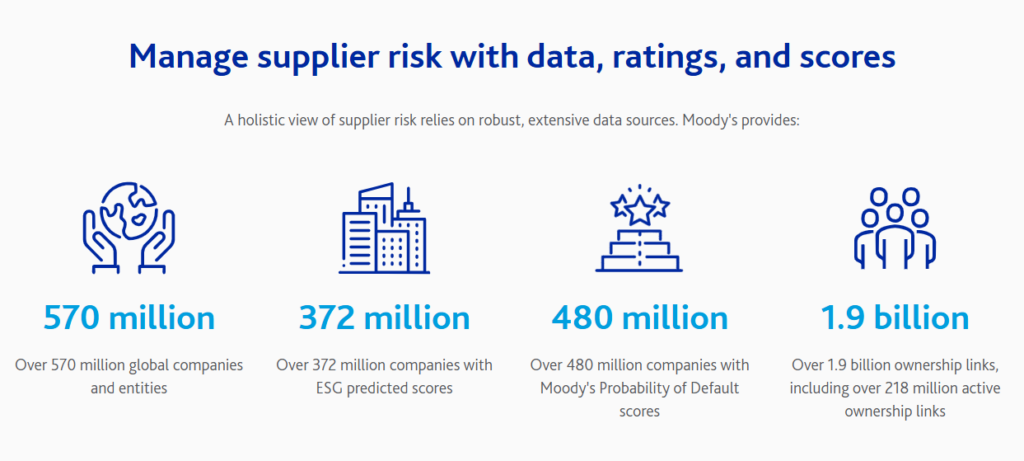
Source: Moody’s
Moody’s sources data from over 170 different sources, making their database exceptionally broad and deep.
While the database collects a vast amount of data, the primary use cases, as listed on the Orbis page, are:
But, we need to note that Moody’s also offers ESG ratings, as illustrated below:

Source: Moody’s
However, compared to tools like Veridion, you might not find as much granular supplier performance or operations data essential for day-to-day procurement operations.
Still, for professionals who require in-depth corporate financial analysis, risk assessment, and compliance checks, this might be a great database to explore.
Kompass is a global B2B directory connecting buyers and suppliers worldwide.
It boasts over 57 million companies across 70+ countries.
Compared to other, more comprehensive tools on our list, Kompass offers limited company profiles and product catalogs, with less in-depth data.
For instance, take a look at one of their company profiles below:

Source: Kompass
If we examine their offerings closely, we can see that their database and features are primarily aimed at providing accurate contact information and identifying key organizational executives to facilitate communication.
This means you won’t find essential information like supplier performance insights, ESG data, and other deeper analytical data points.
While the data provided is limited, this is still a powerful feature set, especially when considering the ability to build custom lists with their Company EasyList builder.
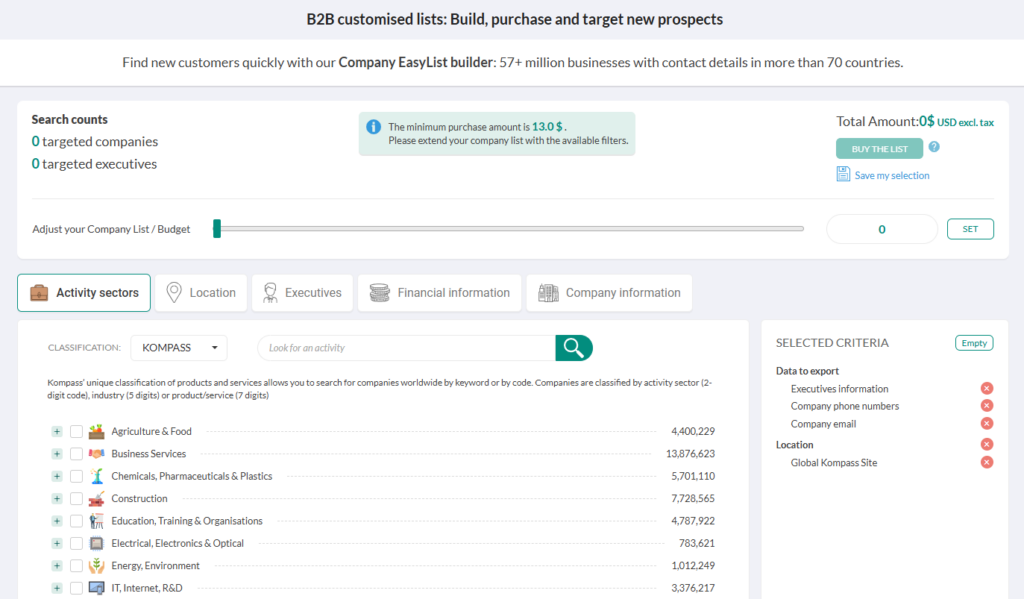
Source: Kompass
You get an easy-to-use interface for selecting your filters, criteria, and flexible pricing based on list size and budget.
This makes Kompass a valuable resource for businesses primarily focused on identifying and connecting with potential suppliers internationally, particularly for lead generation and initial outreach.
However, if you require in-depth company data, financial analysis, or risk assessments, you might need to consider other providers on this list.
The last on our list is Thomasnet, a product sourcing and supplier discovery platform specializing in connecting buyers with North American manufacturers and distributors.
Thomasnet has a database of 500,000+ suppliers.
The main advantage of this platform is that its database, while limited in size and geographic scope, is easily accessible by searching for companies or categories directly on their website.

Source: Thomasnet
If you’re a procurement expert or buyer, using Thomasnet to search for suppliers and explore the database is completely free.
The features include:
Another valuable feature is Thomasnet’s extensive collection of manufacturer and distributor catalogs.
Here, you can find detailed product information, specifications, and CAD drawings, often directly from the source.
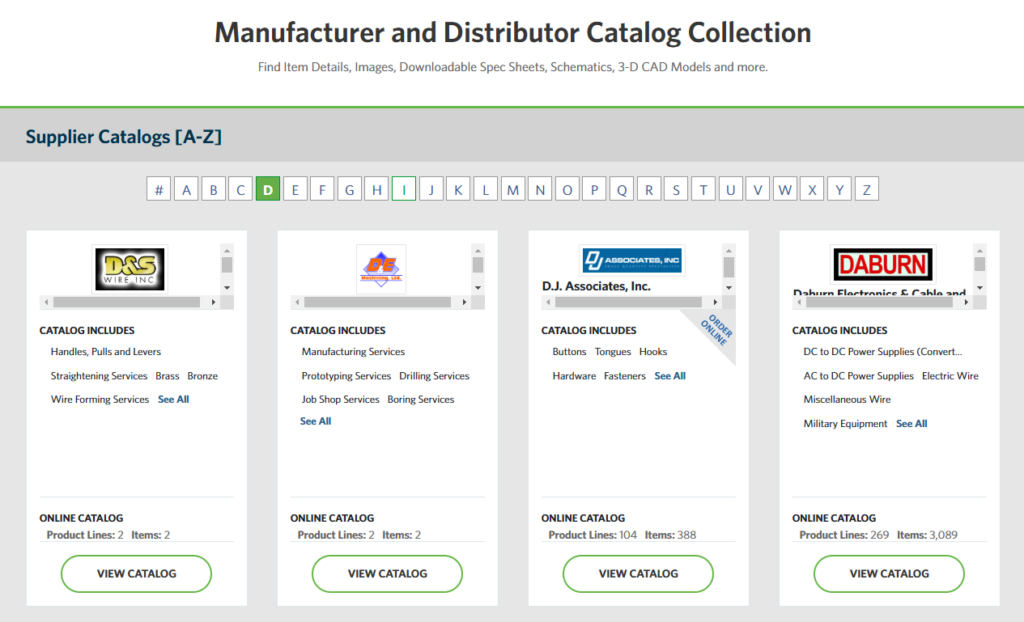
Source: Thomasnet
This feature allows for a more thorough informed sourcing process and helps you find the right components or products for your needs.
However, one limitation of Thomasnet is its method of vetting suppliers.
Each supplier is reviewed manually by an analyst using company-submitted data such as products, services, website, and certifications.
While this ensures accuracy, it also means the database may not be as dynamic or up-to-date as platforms that rely on machine learning and automation to ensure unbiased, real-time data.
To summarize, while Thomasnet’s database is relatively small in both size and the range of data offered compared to other providers on this list, it’s a great addition to your toolkit if your focus is on sourcing from North American suppliers.
These were the nine leading data providers in the procurement space.
We’ve covered their key strengths, the specific types of data they offer, and some of the use cases they are best for.
While you may already be familiar with or using some of these tools, we hope you’ve discovered something new—whether it’s an emerging data provider or a fresh perspective on how existing ones can solve your current procurement challenges.
So, go ahead and explore some providers further to see how they can strengthen your procurement strategy and, ultimately, drive better business outcomes.